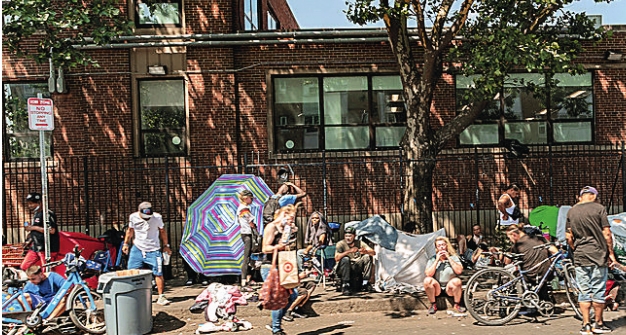
A year after the city put Long Island at the center of its long-term recovery plans, officials seem no closer to actually finding the money to make it a reality.
City government is keeping quiet about how much it would cost to get the island’s derelict facilities operational once the bridge is rebuilt, but even low estimates in the hundreds of millions of dollars would be a massive undertaking given Boston’s capital budget.
The shuttered facility helped kick off today’s crisis when it was abandoned in 2014, and in 2024 the Wu administration gave it new prominence as the endgame solution to difficulties siting long-term recovery options. The focus then was on permitting and paying for the bridge, and officials didn’t have solid answers about funding for the larger undertaking of rebuilding the recovery campus.
A year later, little seems to have changed.
The
mayor’s office did not respond as of press time to repeated requests
for an updated roadmap or new estimates, nor did Senior Infrastructure
Advisor Chris Osgood.
Sue
Sullivan, executive director of the Newmarket Business Improvement
District, said that she and other civic leaders in the South End haven’t
gotten a clearer picture from the administration either.
“What
we know is, it’s at least five to ten years away from happening,” she
said. “No [we haven’t gotten any estimates.] Osgood gave an update to
the working group a few months ago and didn’t give price estimates, just
indicated that they’re doing some work to shore up some of the
buildings there.”
Osgood
did publicly note in August 2024 that the administration planned to
split up the project into smaller sections to divide its upfront costs.
Beyond that, the mayor’s office simply said it would look for funding in
the capital budget and possibly from private philanthropy.
Old
estimates from the tenure of former Mayor Martin Walsh estimated campus
reconstruction would cost upwards of $550 million, almost certainly an
undercount today after years of inflation and spiking construction
costs. More recent estimates from private developers suggest the cost
could be over $1 billion.
City Councilor Erin Murphy told The Boston Guardian that the city’s capital budget simply doesn’t have that kind of slack.
“[Finding that money would
be] nearly impossible right now,” she said. “The $35 million Charleston
Pool renovation was a lot of money. And then we put a hold on wanting to
renovate Madison Park High while we go through the process of trying to
get money through the state. We’re talking years before we go forward
with any much-needed renovation. And they’re talking hundreds of
millions there? I don’t see how we would find that money.”
She also cautioned against counting on outside funding from the state or federal government as wallets tighten nationally.
“The
city would have to look elsewhere or find different streams or cut
other departments because we’re not broke obviously, but we are losing
grant funding and state and federal funding,” she said. “What other
projects would then be put on hold? Madison Park would cost around $700
million, and we’ve already committed to that hoping to get some money
from the Massachusetts Building Authority. I don’t see how we could do
both projects.”
State
Senator Nick Collins said that a $1 billion cost estimate sounded
correct to him, and that he was skeptical even a divided upfront cost
would find support at the state level today. He suggested recovery
campuses at the Shattuck Hospital or on a retrofitted cruise ship might
be more attainable.
“A
request like that has to be met with a policy change,” he said. “Any
time you’re looking at an investment like that, like when we dredged the
harbor, the state, city and federal government each had a significant
commitment. Right now, I don’t see anybody getting behind a
billion-dollar request with the city’s current policies.”
Murphy
expressed some frustration with the amount of emphasis Long Island gets
when it’s years away and residents face severe disruptions today. She
wanted to see the city take action on a closer timescale, hardening
enforcement and establishing a more robust treatment system with
existing property.
Sullivan
had similar stances. She and other stakeholders in the South End will
be meeting for new talks with the city in July, and among their highest
priorities is getting a plan in place to implement the Recover Boston
interim treatment facility. She said she hopes to have a concrete plan
within six months.
“We’re
saying, ‘Let’s figure out how we can make this happen at least until
Long Island is actually any kind of reality,” she said. “We need it now.
We can’t wait five or ten years.”